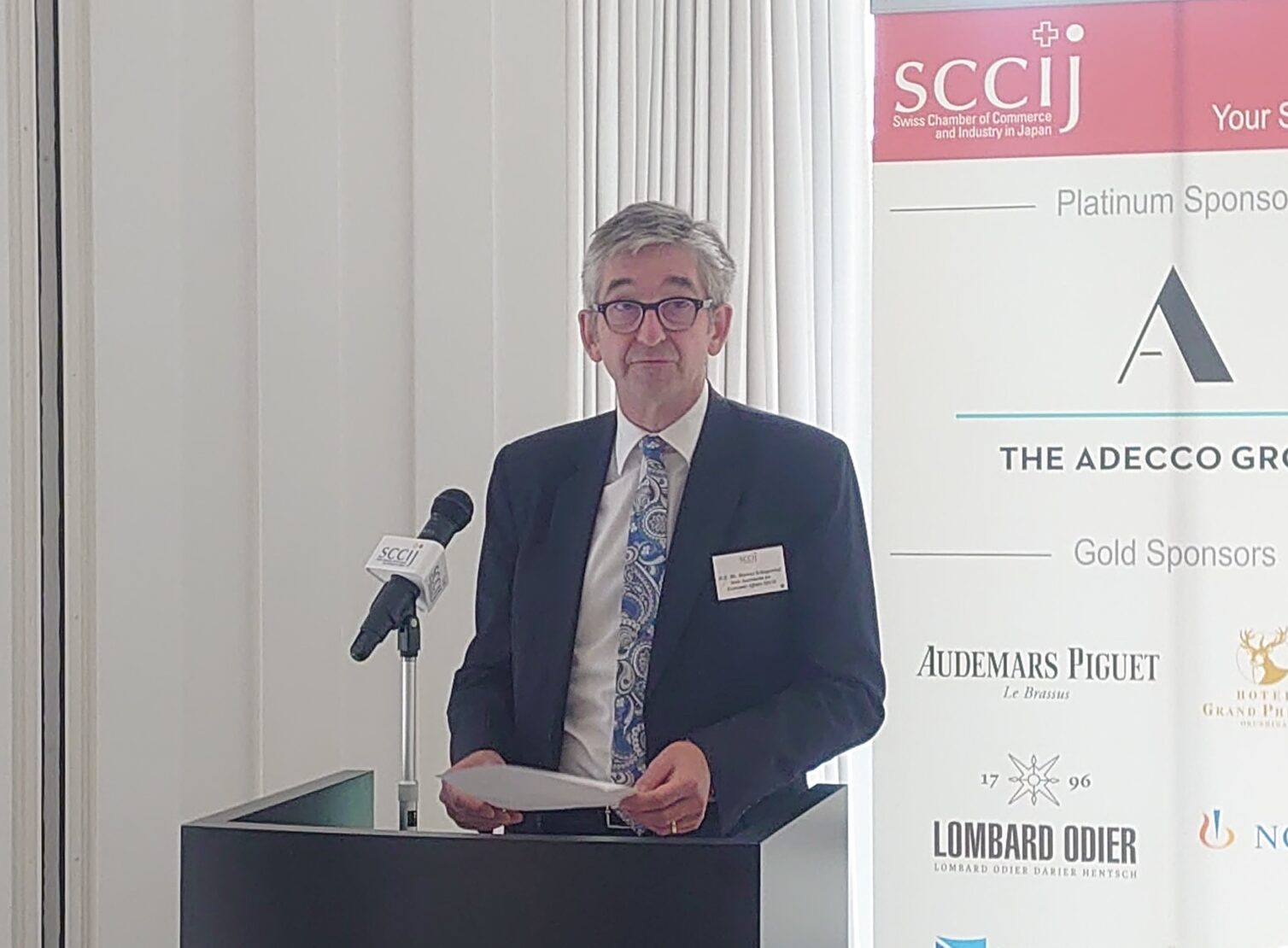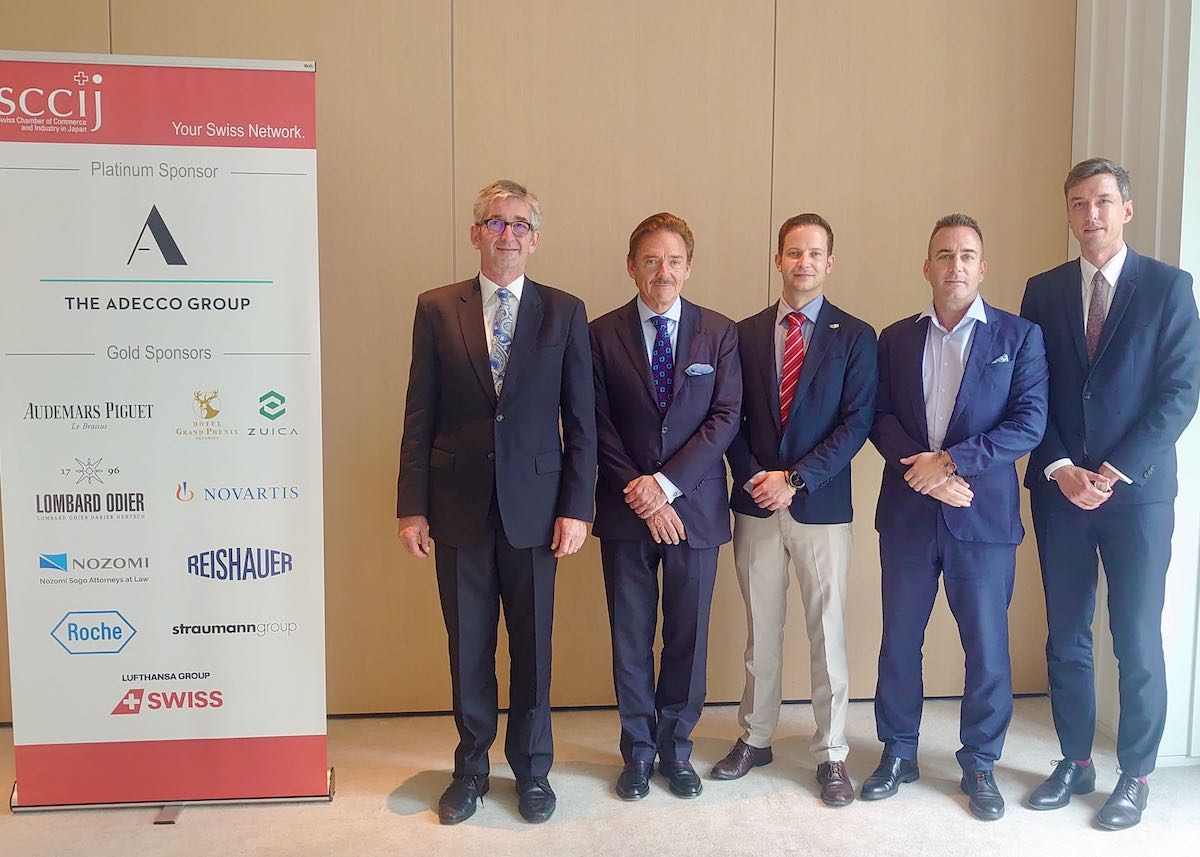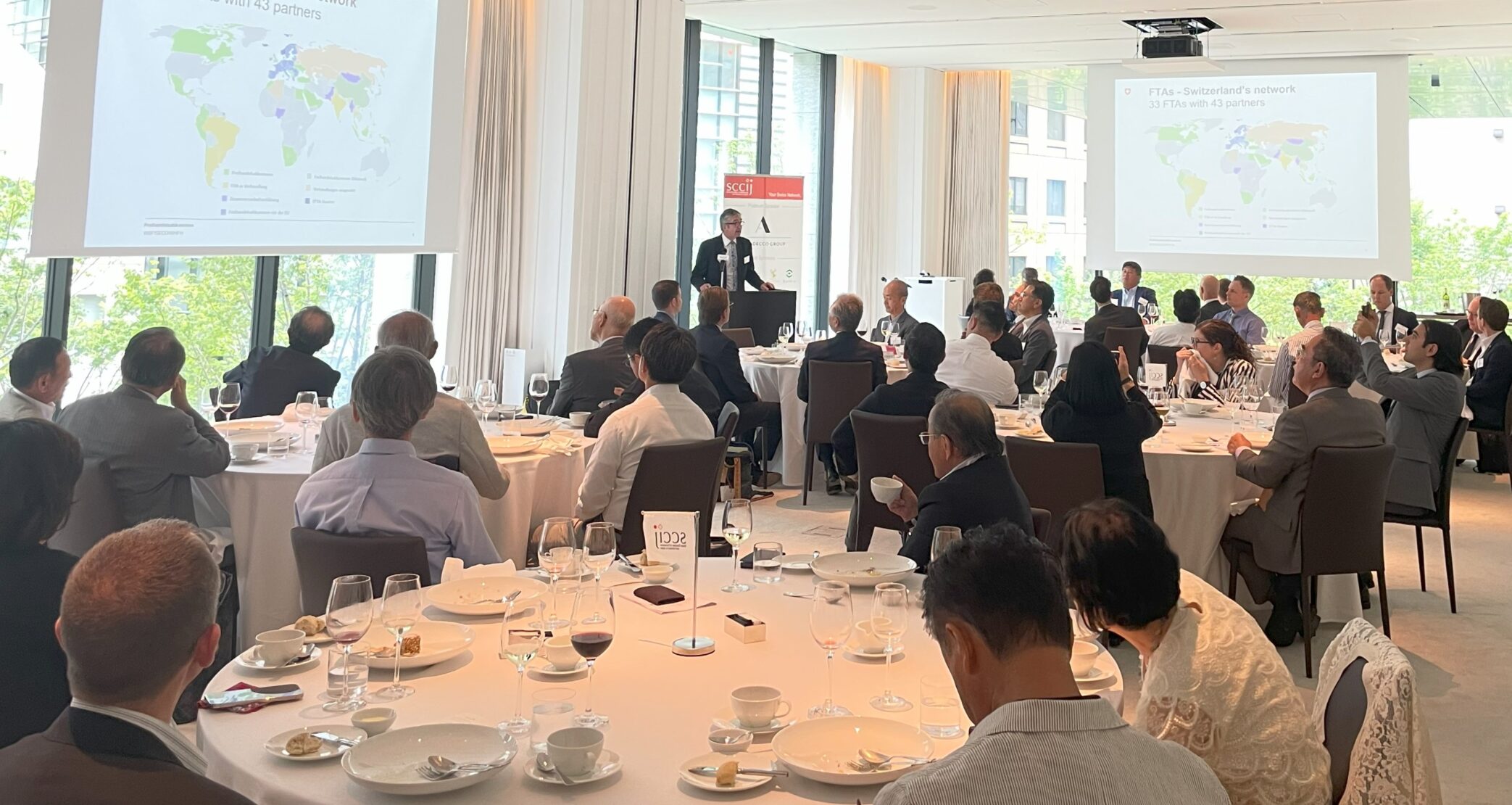Tokyo (SCCIJ) – Luncheon Speaker Ambassador Markus Schlagenhof, Head of World Trade, State Secretariat for Economic Affairs SECO, discussed how Swiss trade is challenged by negative trends in globalization and how the export-heavy Swiss economy protects itself from these developments. We summarize his talk in Q&A form and include updates on the bilateral free trade agreement based on a written exchange after his official visit to Japan.

SCCIJ July Luncheon speaker Ambassador Markus Schlagenhof
The news headlines talk about a new world order, e.g. friendshoring and restrictions for semiconductors. Can you imagine a world with globalization in reverse?
Mr. Markus Schlagenhof: I do not see this happening, but major changes are undoubtedly on the agenda. The interaction and rivalries among major powers will alter international supply chains and trade flows, which will affect in particular, the most vulnerable, the small and medium-sized economies.
Yet eminent voices claim that free trade agreements are an instrument of the 20th century.
M. Schlagenhof: I strongly disagree. At a time when the future of multilateralism is very uncertain, many key players continue to expand their network of free trade agreements (FTAs). Such agreements are all the more important for small and medium-sized economies like Switzerland. As long as our main competitors conclude such agreements with third countries, we must do the same if we want to ensure level playing for our companies.
Why it has become so much more difficult to conclude free trade agreements nowadays and why has it become even harder to get them approved?
M. Schlagenhof: Part of the answer is that today our stakeholders are not only looking at what and how much we trade any longer, they are also getting increasingly concerned with whom we trade and under what conditions. The origin and method of production of goods traded have become the subject of constant questioning in the public debate in Switzerland. Civil society is asking questions about the impact of trade and production in partner countries and on the environment, society, and the individuals concerned.

: Members and advisors of the SCCIJ Executive Committee with July Luncheon speaker Ambassador Markus Schlagenhof.
What can Switzerland as a medium-sized economy do to protect itself against possible negative developments in globalization?
M. Schlagenhof: The royal path would be the multilateral one, at least from the point of view of Swiss trade policy. Fear is a bad adviser, and inward-looking attitudes have never proven to be good answers. We must continue to advocate for open trade relations. There is still considerable potential to develop and consolidate our network of trade agreements around the world. We must continue to diversify our trade opportunities and supply chains by winning new partners. This is, in my view, how to best create the conditions needed to reduce our dependencies on major traditional partners and secure additional supply chain opportunities.
Major progress at the multilateral level is still very difficult to achieve at this moment. Should Switzerland focus on bilateral trade relations?
M. Schlagenhof: There is still life on the multilateral scene. The 12th WTO Ministerial Conference was a success, but as a matter-of-fact major progress at multilateral level in terms of market access liberalization still seems very difficult at the moment. Hence the importance of the bilateral way (FTAs) offer us preferential access conditions on foreign markets. They eliminate or prevent competitive disadvantages in markets where our competitors have preferential relations. They create stability and legal certainty for economic exchanges. And last but not least, they contribute to the overarching objective of sustainable development.
But aren’t these ideas and values rather abstract?
M. Schlagenhof: No, they are not. Such agreements enable our exporters and importers to save altogether 4 billion CHF each year. Also, the bilateral approach has its own merits. Such agreements are an important laboratory for testing new ideas, innovative approaches, and new disciplines that could one day perhaps be taken up at the multilateral level and lead to new WTO agreements. Let me highlight: some topics that we included 15 years ago in our bilateral FTA with Japan such as e-commerce are areas in which now negotiations take place at the multilateral level.

The SCCIJ July Luncheon was fully booked..
What are the chances of a modernization of the free trade agreement with Japan?
M. Schlagenhof: The challenge with all modernization of agreements is to find a new equilibrium and sufficient interest on both sides to update and modernize these agreements. During my visit to Japan, I once again vigorously advocated for such a modernization. Indeed, Switzerland has regularly and consistently raised this request with Japanese counterparts since 2018 through all channels, both at the political and expert levels. However, during my visit, Japan once again stated that it is not in a position to amend the agreement. The Japanese colleagues argue that we seek additional market access for agricultural products, which are highly sensitive for Japan, while Japan does not see a sufficient potential for gains in terms of additional market access to Switzerland. I remain convinced that a mutually beneficial modernization of the pioneer agreement is feasible, in particular if we look at the overall potential for modernization also in other areas than market access. We therefore regret the Japanese position, while acknowledging that it is unlikely to change for the coming years.
Why is it necessary for Switzerland to modernize this agreement?
M. Schlagenhof: The agreement has served Japanese and Swiss companies well overall. However, a lot has happened since 2008 when it was concluded in substance. The shape of international trade relations has developed, new trade disciplines have surfaced and bilateral agreements have become more and more comprehensive. I think it’s fair to assess that our economic partnership agreement is not entirely up to today’s standards any longer. Specifically, with regard to selected products, in particular in the agricultural domain, the advanced agreement concluded by Japan with the European Union in 2019 results in discrimination of Swiss products on the Japanese market. Beyond ensuring a level playing field in terms of market access, Switzerland seeks a modernization in areas such as rules of origin, e-commerce, trade facilitation, trade in sustainable development or public procurement.
Switzerland has built upon one of the densest network of free trade agreements in the world. What will be future bring?
M. Schlagenhof: The low-hanging fruits have been harvested. Current and future negotiations are increasingly demanding. Generally speaking, it has become more difficult to reconcile the various domestic policy instruments and the interests of our partners to bring the negotiations to a successful conclusion. And yet, free trade agreements remain an important instrument for defending Switzerland’s economic interests. We should therefore pursue our efforts to conclude and develop such agreements with creativity and perseverance.
About the speaker
Ambassador Markus Schlagenhof (*1965) holds the position of Delegate of the Federal Council for Trade Agreements and head of the World Trade Division in the Foreign Economic Affairs Directorate since 1st September 2016. Previously, he was head of the WTO unit of the World Trade Division and head of the International Movement of Goods unit of the Special Foreign Economic Service Division (in this function he was already involved in the negotiations of a FTEPA with Japan). He joined the former Federal Office for Foreign Economic Affairs (FOFEA) in 1995 and worked as an associate researcher in the WTO unit.
Text: Martin Fritz; Pictures: SCCIJ





























